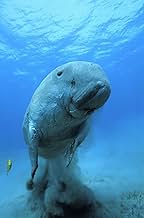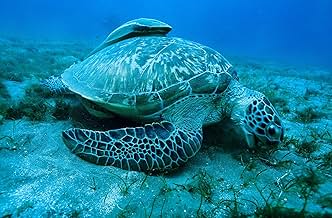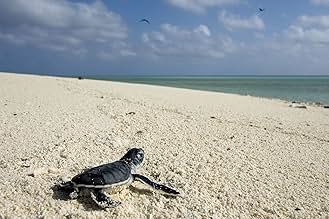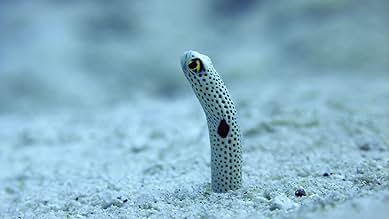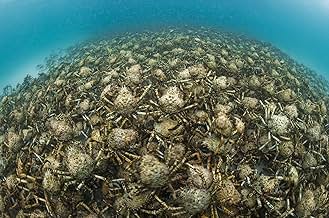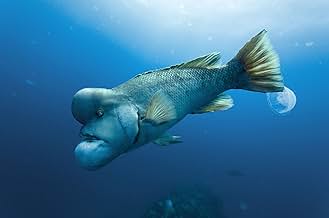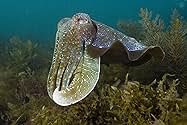AVALIAÇÃO DA IMDb
7,7/10
10 mil
SUA AVALIAÇÃO
Adicionar um enredo no seu idiomaAn ecological drama/documentary, filmed throughout the globe. Part thriller, part meditation on the vanishing wonders of the sub-aquatic world.An ecological drama/documentary, filmed throughout the globe. Part thriller, part meditation on the vanishing wonders of the sub-aquatic world.An ecological drama/documentary, filmed throughout the globe. Part thriller, part meditation on the vanishing wonders of the sub-aquatic world.
- Direção
- Roteiristas
- Artistas
- Prêmios
- 2 vitórias e 4 indicações no total
Pierce Brosnan
- Narrator
- (English version)
- (narração)
Pedro Armendáriz Jr.
- Narrator
- (Latin version)
- (narração)
Rie Miyazawa
- Narrator
- (narração)
Jacques Perrin
- Self - Narrator
- (narração)
Matthias Brandt
- Narrator
- (German version)
- (narração)
Oleg Basilashvili
- Narrator
- (Russian version)
- (narração)
Aldo Baglio
- Narrator
- (Italian version)
- (narração)
- (as Aldo)
Manolo Garcia
- Narrator
- (Spanish version)
- (narração)
Avaliações em destaque
10PWNYCNY
First, if you want to watch a movie featuring incredible cinematography, this is the movie to watch. This is the movie that will cause you to ask: "How DID they get that shot?" The ocean is a big place and there's lots to photograph. The denizens of the deep are portrayed in a respectful and almost reverential manner. One scene in which one of the divers is swimming WITH a great white shark was both spectacular and emotional. This is the first movie this reviewer can recall where a great white shark is portrayed as something other than a wanton killer. The majesty of the sea creatures is awe inspiring. They deserve our protection; they must be preserved and they warrant our undivided admiration and respect. Objects for our amusement in captivity and considered a source of food, this movie shows the audience a different side of these sea creatures, a side that we rarely if ever notice or care about, but nevertheless is there. This movie is a definite must-see for children of all ages.
There is a sequence in Oceans that blows my mind. A stone crab emerges from the seabed and crawls along. Another follows. And then a few more follow. The camera then trails these creatures as they make their way to somewhere in the middle of nowhere. The stone crabs are joined by more of their own. Suddenly, in an establishing shot that continues to baffle me, the camera reveals what seems like hundreds of thousands of stone crabs in "a great big orgy". The sandy seabed that stretches for miles and miles could not have been more alive.
That is only one of a number of spectacular scenes on show. Another highly memorable sequence shows deft skill in quick cutting as hundreds of predatory birds dive headfirst into the water at startling speeds as the camera captures their assault on small fishes through above water and underwater shots. The latter is quite incredible, and eerily reminiscent of bullets ripping through the water in the Normandy beach scene of Spielberg's Saving Private Ryan (1998).
Jacques Perrin, whose previous film credits famously include acting as the adult Toto in Tornatore's Cinema Paradiso (1988), director of the excellent Oscar-nominated documentary Winged Migration (2001), and producer of Z (1969) and The Chorus (2004), now has Oceans in his resume, a documentary that explores in amazing detail what happens under the sea, bright day or still night, stormy or fine weather. The result is like nature washing over you as you drown in its unrivalled beauty. There is no gasping for air but the taking in of the vitality of life.
Oceans surprisingly works well as "a thriller". In certain sequences, Perrin opts for suspense, such as the one involving baby turtles as they evade hungry birds, making their way into the sea from the shore in their own version of Normandy. Many of them are eaten while the lucky ones try to survive in the big blue ocean. Even though collectively the turtles represent a faceless mass, we fear for each one of them because Perrin focuses on one or two of them at any one time, heightening the sense of vulnerability.
It is not surprising, however, to see Oceans preaching the ecological message. "Save the planet! Save the animals!" become the general plea for viewers to do their part in protecting their only home in this vast universe. But the plea is not as strong and specifically targeted as what is felt in The Cove (2009), the Oscar-winning documentary that secretly chronicles the slaying of hundreds of dolphins by Japanese fishermen in a hidden lagoon, and has now been controversially and unfairly labeled as "anti-Japanese".
Oceans is lightly-narrated. This is a good move as the stunning underwater cinematography is left to do all the talking, or in this context, to speak in silence to the viewer. Perrin films in cinema verite style; his camera is unbiased, objective, and unobtrusive. His use of original music by Bruno Coulais (The Chorus) is also spot on. Very often, the marrying of melody and motion (that of sea creatures) is a joy to experience, alternating between the subtle and the grandeur.
It's weird to say this but Oceans may leave your forearms bruised. Now, you may wonder why. Well, every once in a while, you might just pinch yourself to see if those beautiful imageries are really real or created with a green screen. Of course, no CG effect could ever replicate nature's beauty. Oceans shows why and that's quite something to think about.
SCORE: 8/10 (www.filmnomenon.blogspot.com) All rights reserved!
That is only one of a number of spectacular scenes on show. Another highly memorable sequence shows deft skill in quick cutting as hundreds of predatory birds dive headfirst into the water at startling speeds as the camera captures their assault on small fishes through above water and underwater shots. The latter is quite incredible, and eerily reminiscent of bullets ripping through the water in the Normandy beach scene of Spielberg's Saving Private Ryan (1998).
Jacques Perrin, whose previous film credits famously include acting as the adult Toto in Tornatore's Cinema Paradiso (1988), director of the excellent Oscar-nominated documentary Winged Migration (2001), and producer of Z (1969) and The Chorus (2004), now has Oceans in his resume, a documentary that explores in amazing detail what happens under the sea, bright day or still night, stormy or fine weather. The result is like nature washing over you as you drown in its unrivalled beauty. There is no gasping for air but the taking in of the vitality of life.
Oceans surprisingly works well as "a thriller". In certain sequences, Perrin opts for suspense, such as the one involving baby turtles as they evade hungry birds, making their way into the sea from the shore in their own version of Normandy. Many of them are eaten while the lucky ones try to survive in the big blue ocean. Even though collectively the turtles represent a faceless mass, we fear for each one of them because Perrin focuses on one or two of them at any one time, heightening the sense of vulnerability.
It is not surprising, however, to see Oceans preaching the ecological message. "Save the planet! Save the animals!" become the general plea for viewers to do their part in protecting their only home in this vast universe. But the plea is not as strong and specifically targeted as what is felt in The Cove (2009), the Oscar-winning documentary that secretly chronicles the slaying of hundreds of dolphins by Japanese fishermen in a hidden lagoon, and has now been controversially and unfairly labeled as "anti-Japanese".
Oceans is lightly-narrated. This is a good move as the stunning underwater cinematography is left to do all the talking, or in this context, to speak in silence to the viewer. Perrin films in cinema verite style; his camera is unbiased, objective, and unobtrusive. His use of original music by Bruno Coulais (The Chorus) is also spot on. Very often, the marrying of melody and motion (that of sea creatures) is a joy to experience, alternating between the subtle and the grandeur.
It's weird to say this but Oceans may leave your forearms bruised. Now, you may wonder why. Well, every once in a while, you might just pinch yourself to see if those beautiful imageries are really real or created with a green screen. Of course, no CG effect could ever replicate nature's beauty. Oceans shows why and that's quite something to think about.
SCORE: 8/10 (www.filmnomenon.blogspot.com) All rights reserved!
It's important to note there are TWO versions of this film. Jacques Perrin's original runs 104 minutes and is narrated by Perrin in French. Disney bought the film, cut 20 minutes (much of it critical of human activity endangering the oceans and animal habitats), junked Perrin's spare narration, which lets you wonder at the sights on view, and substituted a gabby but emotionally chilly commentary by Pierce Brosnan.
Perrin's original version is not available in the US, per contract with Disney. The original is available in Europe on DVD and Blu-Ray (but unplayable on most US machines) but it seems to lack English subtitles. So you're pretty much stuck with Disney edition.
The original, however, is to my mind better and much more in line with Perrin's "Winged Migration" than the Disney version. The best that can be said for the US edition is that plays down the "humanizing" of animal life that was an annoy hallmark of Disney's True-Life Adventures of the 1950s.
Perrin's original version is not available in the US, per contract with Disney. The original is available in Europe on DVD and Blu-Ray (but unplayable on most US machines) but it seems to lack English subtitles. So you're pretty much stuck with Disney edition.
The original, however, is to my mind better and much more in line with Perrin's "Winged Migration" than the Disney version. The best that can be said for the US edition is that plays down the "humanizing" of animal life that was an annoy hallmark of Disney's True-Life Adventures of the 1950s.
10chadelle
Absolutely stunning. Simply the most beautiful underwater imagery I've ever seen. It's hard to remain not too affected when talking about ecology. Here, the off screen speech is quite subtle, not too naive and not boring, because sparingly used, which leaves long lapse of dreamy sequences, without a word. Technically, it's easily one of the best documentary ever made. The camera work and photography are incredible, the montage is very effective, alternating slow and fast paced sequences. The score is not too obtrusive. There is a very striking scene, which reminds me the nautical funerals of Laetitia in "Les Aventuriers" by Robert Enrico, if you see what I'm referring to, you will easily notice it, and I assure this scene will stick to your mind for days... Visually stunning, subtle, very recommended.
Making its world premiere at last year's Tokyo International Film Festival, Oceans is the latest enviro-documentary to hit the big screens, highlighting that while outer space is touted as the final frontier to be conquered by man, the waters around our land mass hold just as much fascination with the countless of species available in the depths of the ocean. Oceans, by directors Jacques Perrin and Jacques Cluzaud, provide us that glimpse 20,000 leagues under the sea.
For those, like me, who are absolutely clueless about the sea creatures other than what can be put on the dining table, you'll be left quite flabbergasted as you observe the various species being featured on screen, without any prompt or subtitle to label just exactly what creature they are. Of course for those who are schooled by Finding Nemo, you're likely to be able to name some of what's featured, just as the noisy young boy sitting beside me was able to, being somewhat of a help.
Aside from the usual gorgeous cinematography featuring schools of dolphins in motion, and plenty of synchronized swimming, with creatures big and small ranging from the giant whales to the newly hatched turtles struggling to make it to the waters before being picked up mercilessly by their predators, this is one documentary that allows you to go up close to these creatures since cameras were planted into the depths of all the oceans of the world.
It doesn't come across as preachy, because it doesn't wear its ecological badge in such an obvious manner at all in its sparse narrative. Instead, it does so very subtly, reminding us that there are others with whom we share this Earth with, and if we continue to plunder and pollute the land and treat the sea as sewage (so is that gaping hole capped by BP already?), then these are the creatures that we will lose in the near future, causing a major upset in the balance of Nature, and who can predict how Nature's wrath will be incurred back on us.
Nature documentaries are no longer made for the small screen, but have some mighty budget to be able to bring quality to the making of such films, serving to entertain and to capture beauty so rarely seen.
For those, like me, who are absolutely clueless about the sea creatures other than what can be put on the dining table, you'll be left quite flabbergasted as you observe the various species being featured on screen, without any prompt or subtitle to label just exactly what creature they are. Of course for those who are schooled by Finding Nemo, you're likely to be able to name some of what's featured, just as the noisy young boy sitting beside me was able to, being somewhat of a help.
Aside from the usual gorgeous cinematography featuring schools of dolphins in motion, and plenty of synchronized swimming, with creatures big and small ranging from the giant whales to the newly hatched turtles struggling to make it to the waters before being picked up mercilessly by their predators, this is one documentary that allows you to go up close to these creatures since cameras were planted into the depths of all the oceans of the world.
It doesn't come across as preachy, because it doesn't wear its ecological badge in such an obvious manner at all in its sparse narrative. Instead, it does so very subtly, reminding us that there are others with whom we share this Earth with, and if we continue to plunder and pollute the land and treat the sea as sewage (so is that gaping hole capped by BP already?), then these are the creatures that we will lose in the near future, causing a major upset in the balance of Nature, and who can predict how Nature's wrath will be incurred back on us.
Nature documentaries are no longer made for the small screen, but have some mighty budget to be able to bring quality to the making of such films, serving to entertain and to capture beauty so rarely seen.
Você sabia?
- CuriosidadesThe English version is narrated by Pierce Brosnan, who played James Bond in 007 Contra GoldenEye (1995), 007 - O Amanhã Nunca Morre (1997), 007 - O Mundo Não é o Bastante (1999), and 007: Um Novo Dia para Morrer (2002). The Spanish version is narrated by Pedro Armendáriz Jr. who played a "Bond ally" alongside Timothy Dalton in 007 - Permissão para Matar (1989).
- Erros de gravaçãoWhen the moon 'rises' horizontally, the narrator says it is "Near the North Pole". However the moon is moving right to left which is what it would look like from the South Pole.
- ConexõesFeatured in The Tonight Show with Jay Leno: Episode #18.37 (2010)
Principais escolhas
Faça login para avaliar e ver a lista de recomendações personalizadas
- How long is Oceans?Fornecido pela Alexa
Detalhes
- Data de lançamento
- Países de origem
- Centrais de atendimento oficiais
- Idiomas
- Também conhecido como
- Oceans
- Locações de filme
- Empresas de produção
- Consulte mais créditos da empresa na IMDbPro
Bilheteria
- Orçamento
- US$ 80.000.000 (estimativa)
- Faturamento bruto nos EUA e Canadá
- US$ 19.422.319
- Fim de semana de estreia nos EUA e Canadá
- US$ 6.058.958
- 25 de abr. de 2010
- Faturamento bruto mundial
- US$ 83.090.556
- Tempo de duração1 hora 44 minutos
- Cor
- Mixagem de som
- Proporção
- 2.35 : 1
Contribua para esta página
Sugerir uma alteração ou adicionar conteúdo ausente








